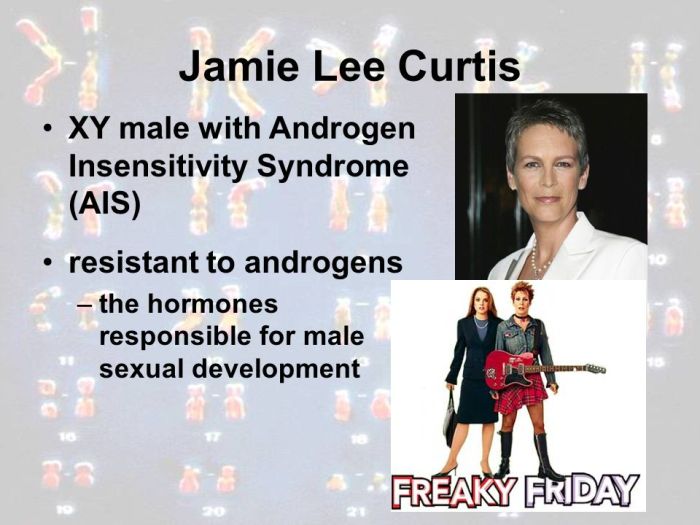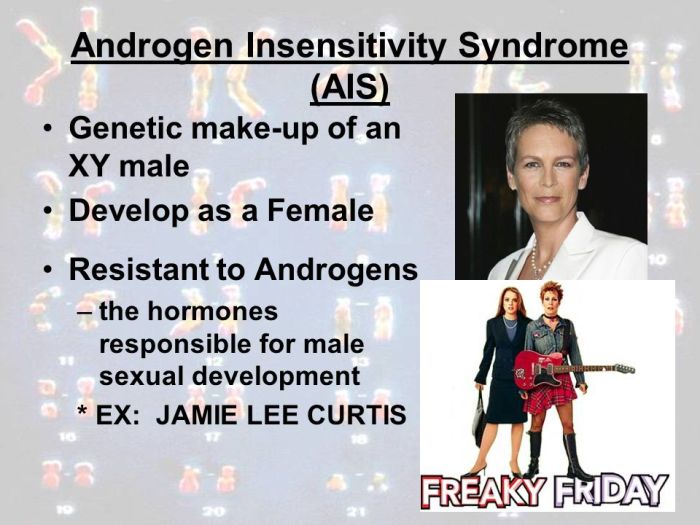Jamie lee curtis androgen insensitivity syndrome – Jamie Lee Curtis’ personal journey with androgen insensitivity syndrome (AIS) offers a unique perspective on the challenges and triumphs faced by individuals with this genetic condition. From her experiences as a woman with AIS to her advocacy for others, Curtis’ story sheds light on the complexities of gender identity, medical treatment, and social acceptance.
Androgen insensitivity syndrome is a rare genetic disorder that affects the body’s response to male hormones. Individuals with AIS are born with XY chromosomes, but their bodies are unable to use testosterone effectively. This can lead to a range of physical and developmental differences, including ambiguous genitalia, delayed puberty, and infertility.
Jamie Lee Curtis’ Personal Experience

Jamie Lee Curtis has been open about her personal journey with androgen insensitivity syndrome (AIS), a genetic condition that affects the body’s response to male hormones. Curtis was diagnosed with AIS at birth and assigned male at birth, but she later transitioned to female during adolescence.
She has spoken out about the challenges and triumphs she has faced as a result of AIS, including the difficulties of growing up with a body that did not match her gender identity, the need for hormone replacement therapy, and the stigma surrounding AIS.
Medical Overview of Androgen Insensitivity Syndrome

Androgen insensitivity syndrome (AIS) is a genetic condition that affects the body’s ability to respond to male hormones (androgens). It is caused by mutations in the androgen receptor gene, which is responsible for regulating the body’s response to androgens. AIS can range in severity from complete androgen insensitivity (CAIS), in which individuals are born with female external genitalia and have no response to androgens, to partial androgen insensitivity (PAIS), in which individuals have varying degrees of androgen resistance.
Symptoms of AIS can vary depending on the severity of the condition. In CAIS, individuals may have female external genitalia, an underdeveloped uterus and fallopian tubes, and no body hair. In PAIS, individuals may have ambiguous genitalia, underdeveloped male external genitalia, or a combination of male and female characteristics.
AIS can also affect fertility, as individuals with AIS may have difficulty producing sperm or eggs.
Social and Cultural Implications of AIS
AIS is a rare condition, and as such, there is often a great deal of stigma and misunderstanding surrounding it. Individuals with AIS may face discrimination and prejudice from others who do not understand the condition. They may also experience difficulty with gender identity and relationships, as they may not fit into traditional gender roles.
However, there are a number of support groups and organizations that provide resources and support to individuals with AIS. These groups can help individuals to connect with others who understand their experiences, and they can provide information and resources to help individuals to live full and healthy lives.
Genetic and Ethical Considerations

AIS is a genetic condition, and as such, it can be passed on from parents to children. The inheritance pattern of AIS depends on the specific mutation in the androgen receptor gene. In some cases, AIS can be inherited in an autosomal dominant manner, which means that only one copy of the mutated gene is needed to cause the condition.
In other cases, AIS can be inherited in an autosomal recessive manner, which means that two copies of the mutated gene are needed to cause the condition.
There are a number of ethical considerations surrounding AIS. One ethical issue is the use of genetic testing for AIS. Genetic testing can be used to identify individuals who have AIS, but it can also be used to identify individuals who are at risk of having children with AIS.
There is some debate about whether or not genetic testing for AIS should be offered to all individuals who are at risk, as some people believe that it is important to give individuals the opportunity to make informed decisions about their reproductive choices.
Representation and Visibility

AIS is a rare condition, and as such, it is often underrepresented in media and popular culture. However, there are a number of individuals with AIS who are using their platforms to raise awareness of the condition and to challenge the stigma surrounding it.
Jamie Lee Curtis is one of the most well-known individuals with AIS, and she has spoken out about her experiences in interviews and in her autobiography.
Other individuals with AIS have also used their platforms to raise awareness of the condition. For example, the actress and model Carolyn Cosgrove has spoken out about her experiences with AIS in interviews and on social media. She has also founded the organization AIS Support, which provides resources and support to individuals with AIS and their families.
Commonly Asked Questions: Jamie Lee Curtis Androgen Insensitivity Syndrome
What is the genetic basis of androgen insensitivity syndrome?
AIS is caused by mutations in the androgen receptor gene, which is located on the X chromosome. These mutations prevent the androgen receptor from functioning properly, which leads to the body’s inability to use testosterone effectively.
What are the different types of AIS?
There are several different types of AIS, ranging from complete androgen insensitivity to partial androgen insensitivity. The type of AIS is determined by the specific mutation in the androgen receptor gene.
What are the challenges faced by individuals with AIS?
Individuals with AIS may face a range of challenges, including ambiguous genitalia, delayed puberty, infertility, and social stigma. They may also experience difficulty with gender identity and body image.